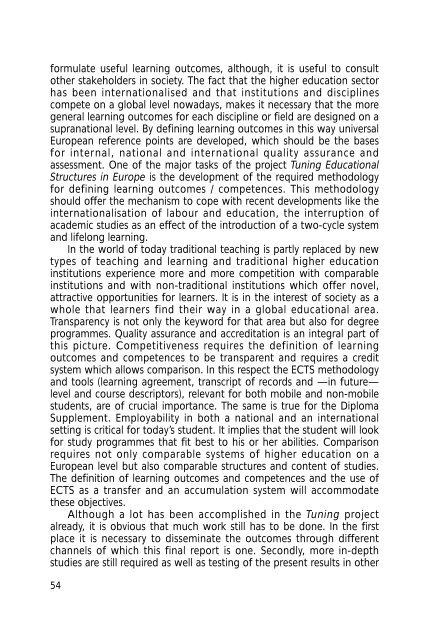Final Report Pilot Project - Relaciones Internacionales de la ...
Final Report Pilot Project - Relaciones Internacionales de la ...
Final Report Pilot Project - Relaciones Internacionales de la ...
You also want an ePaper? Increase the reach of your titles
YUMPU automatically turns print PDFs into web optimized ePapers that Google loves.
formu<strong>la</strong>te useful learning outcomes, although, it is useful to consult<br />
other stakehol<strong>de</strong>rs in society. The fact that the higher education sector<br />
has been internationalised and that institutions and disciplines<br />
compete on a global level nowadays, makes it necessary that the more<br />
general learning outcomes for each discipline or field are <strong>de</strong>signed on a<br />
supranational level. By <strong>de</strong>fining learning outcomes in this way universal<br />
European reference points are <strong>de</strong>veloped, which should be the bases<br />
for internal, national and international quality assurance and<br />
assessment. One of the major tasks of the project Tuning Educational<br />
Structures in Europe is the <strong>de</strong>velopment of the required methodology<br />
for <strong>de</strong>fining learning outcomes / competences. This methodology<br />
should offer the mechanism to cope with recent <strong>de</strong>velopments like the<br />
internationalisation of <strong>la</strong>bour and education, the interruption of<br />
aca<strong>de</strong>mic studies as an effect of the introduction of a two-cycle system<br />
and lifelong learning.<br />
In the world of today traditional teaching is partly rep<strong>la</strong>ced by new<br />
types of teaching and learning and traditional higher education<br />
institutions experience more and more competition with comparable<br />
institutions and with non-traditional institutions which offer novel,<br />
attractive opportunities for learners. It is in the interest of society as a<br />
whole that learners find their way in a global educational area.<br />
Transparency is not only the keyword for that area but also for <strong>de</strong>gree<br />
programmes. Quality assurance and accreditation is an integral part of<br />
this picture. Competitiveness requires the <strong>de</strong>finition of learning<br />
outcomes and competences to be transparent and requires a credit<br />
system which allows comparison. In this respect the ECTS methodology<br />
and tools (learning agreement, transcript of records and —in future—<br />
level and course <strong>de</strong>scriptors), relevant for both mobile and non-mobile<br />
stu<strong>de</strong>nts, are of crucial importance. The same is true for the Diploma<br />
Supplement. Employability in both a national and an international<br />
setting is critical for today’s stu<strong>de</strong>nt. It implies that the stu<strong>de</strong>nt will look<br />
for study programmes that fit best to his or her abilities. Comparison<br />
requires not only comparable systems of higher education on a<br />
European level but also comparable structures and content of studies.<br />
The <strong>de</strong>finition of learning outcomes and competences and the use of<br />
ECTS as a transfer and an accumu<strong>la</strong>tion system will accommodate<br />
these objectives.<br />
Although a lot has been accomplished in the Tuning project<br />
already, it is obvious that much work still has to be done. In the first<br />
p<strong>la</strong>ce it is necessary to disseminate the outcomes through different<br />
channels of which this final report is one. Secondly, more in-<strong>de</strong>pth<br />
studies are still required as well as testing of the present results in other<br />
54


